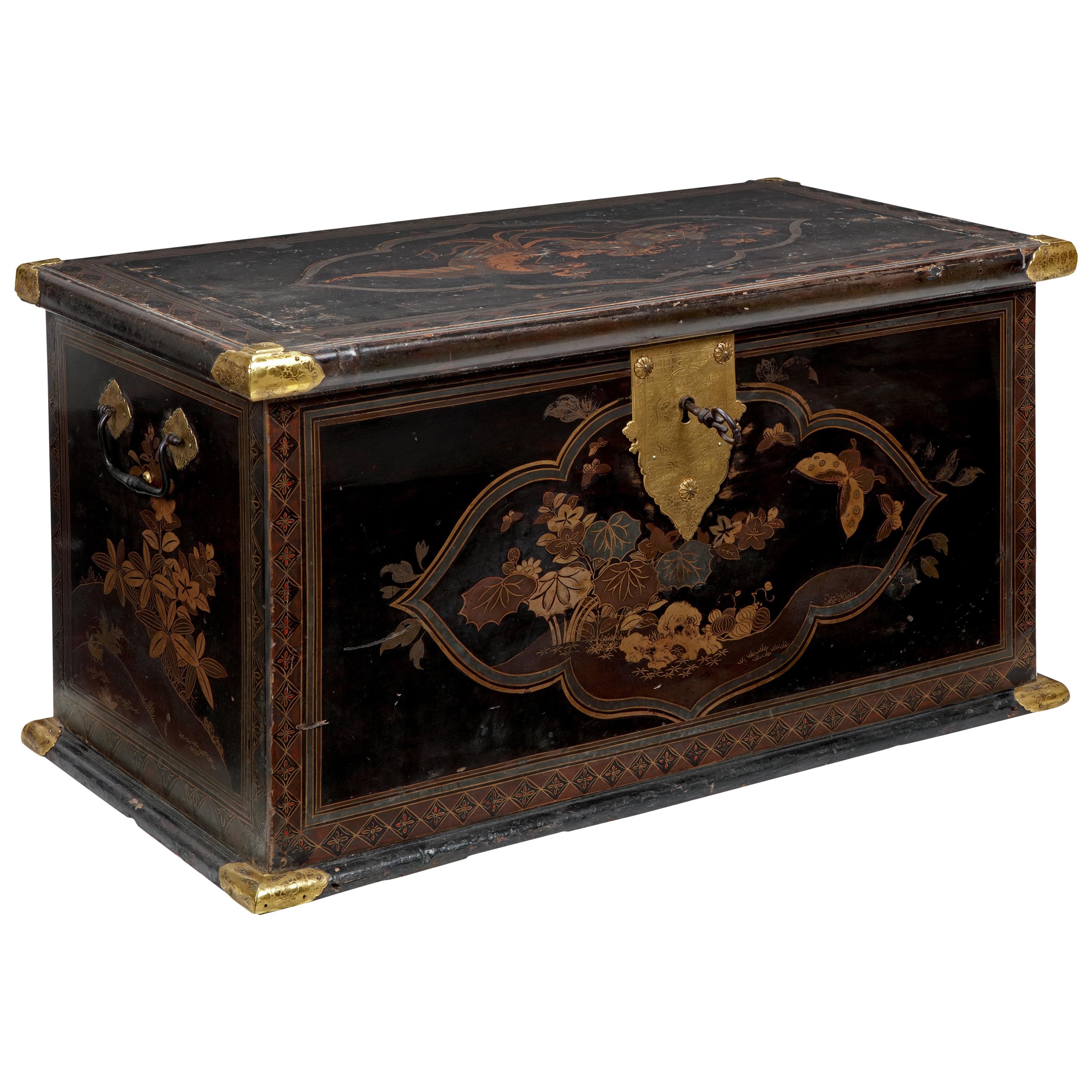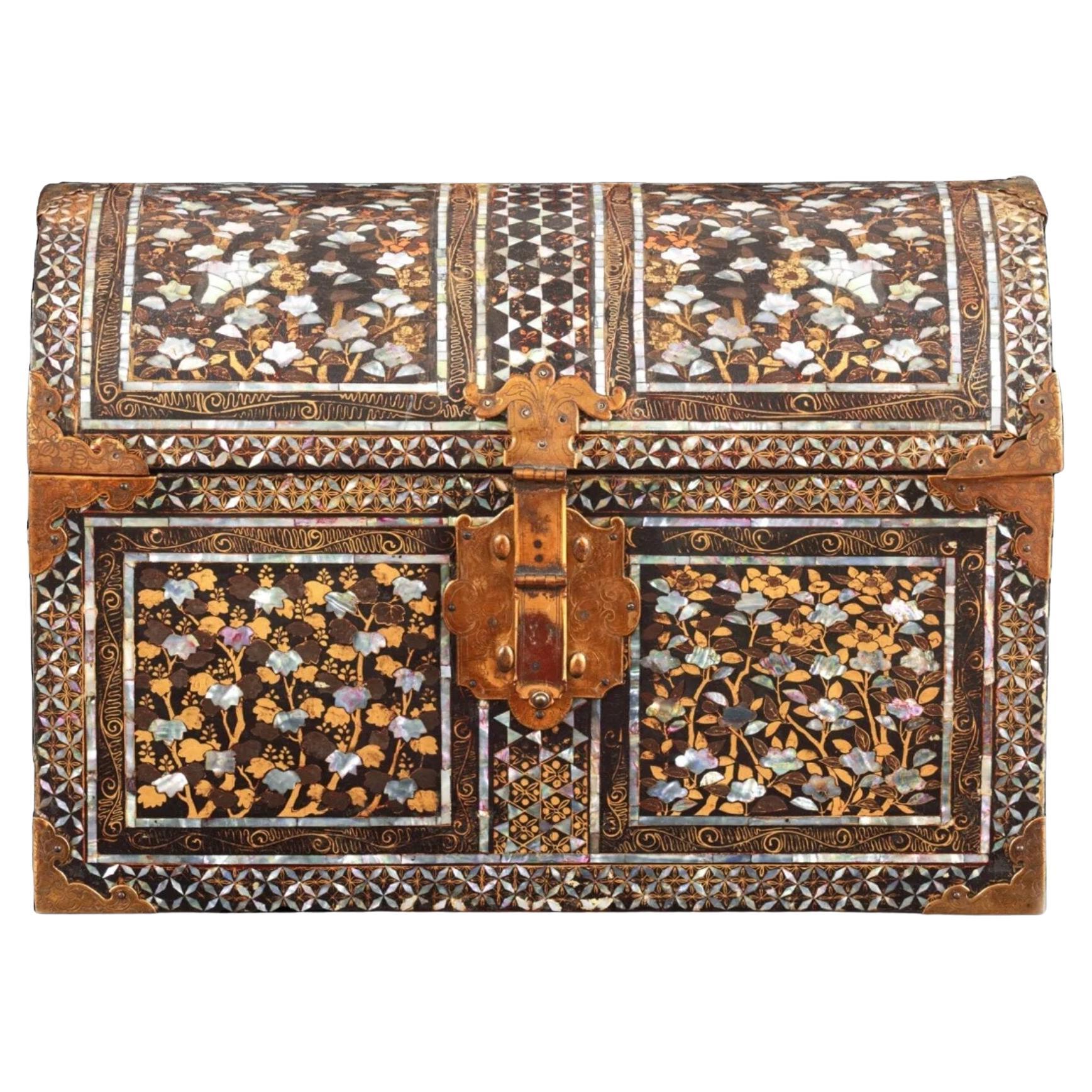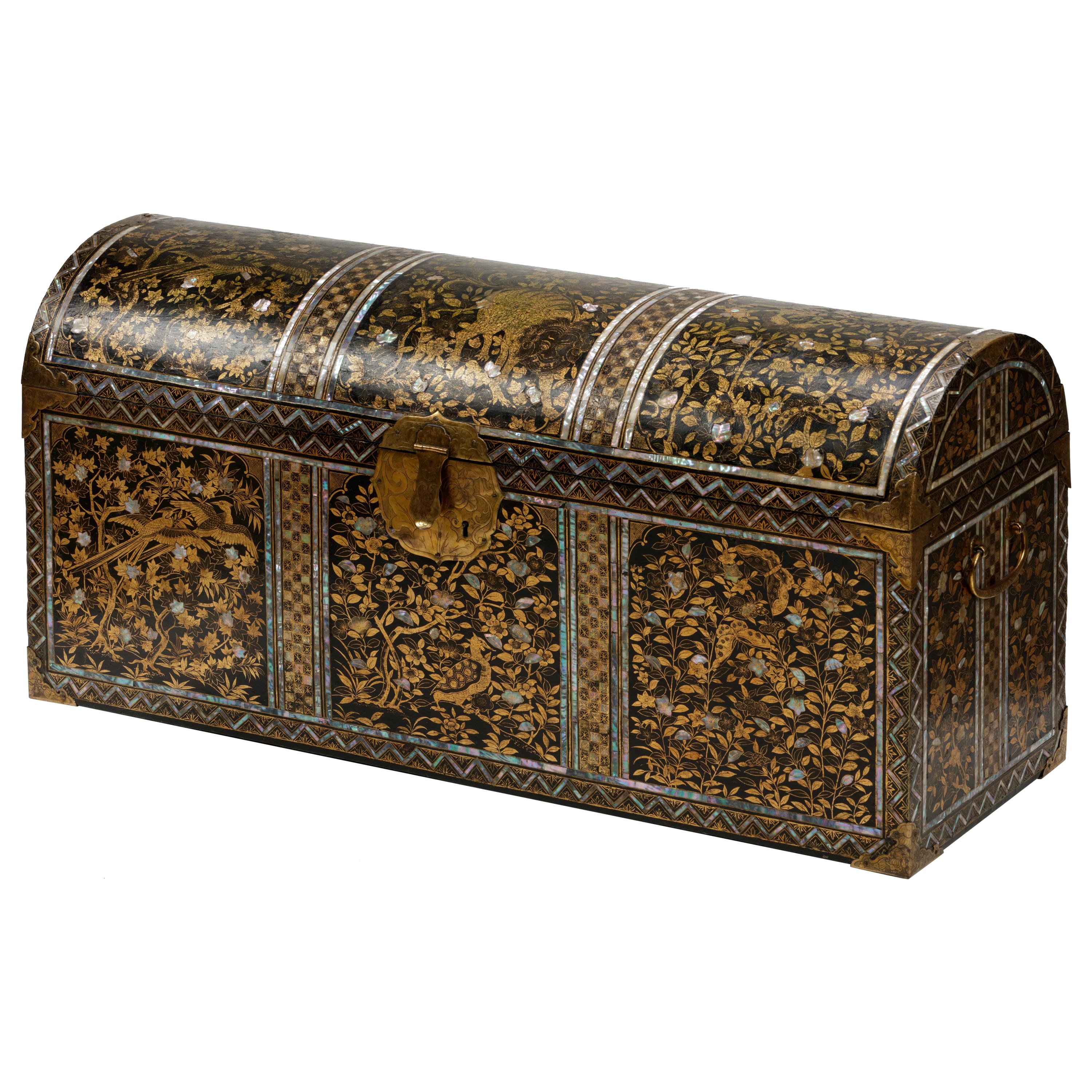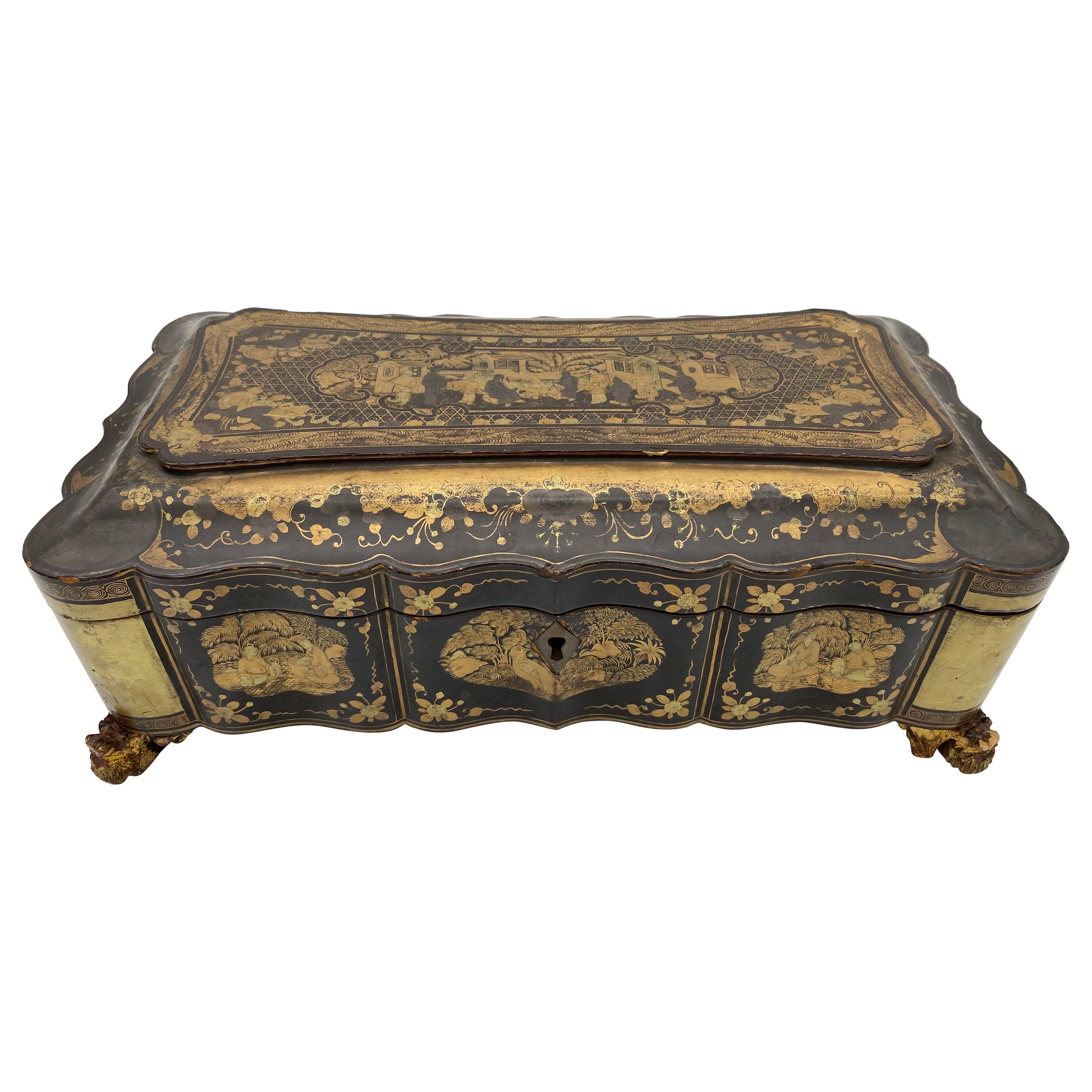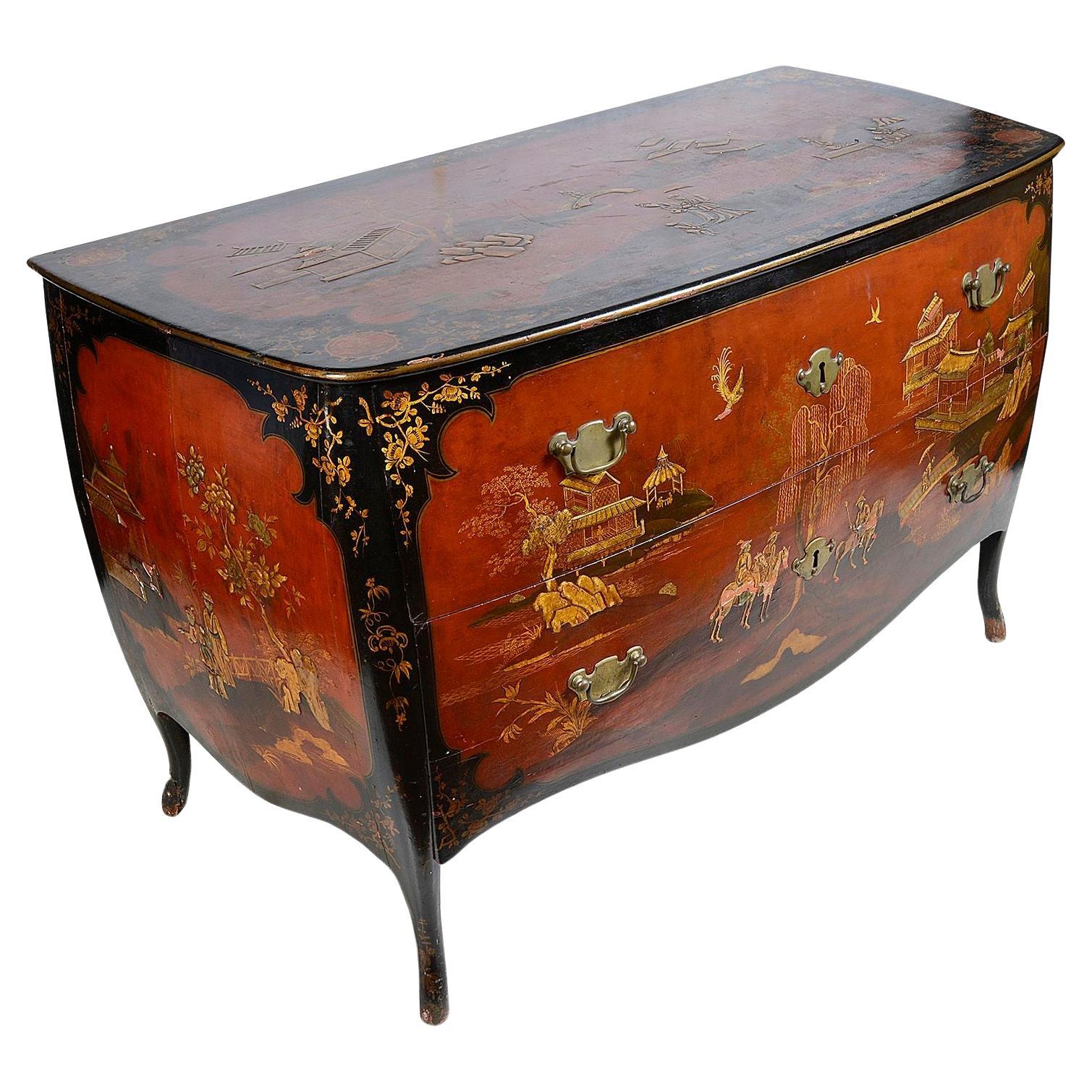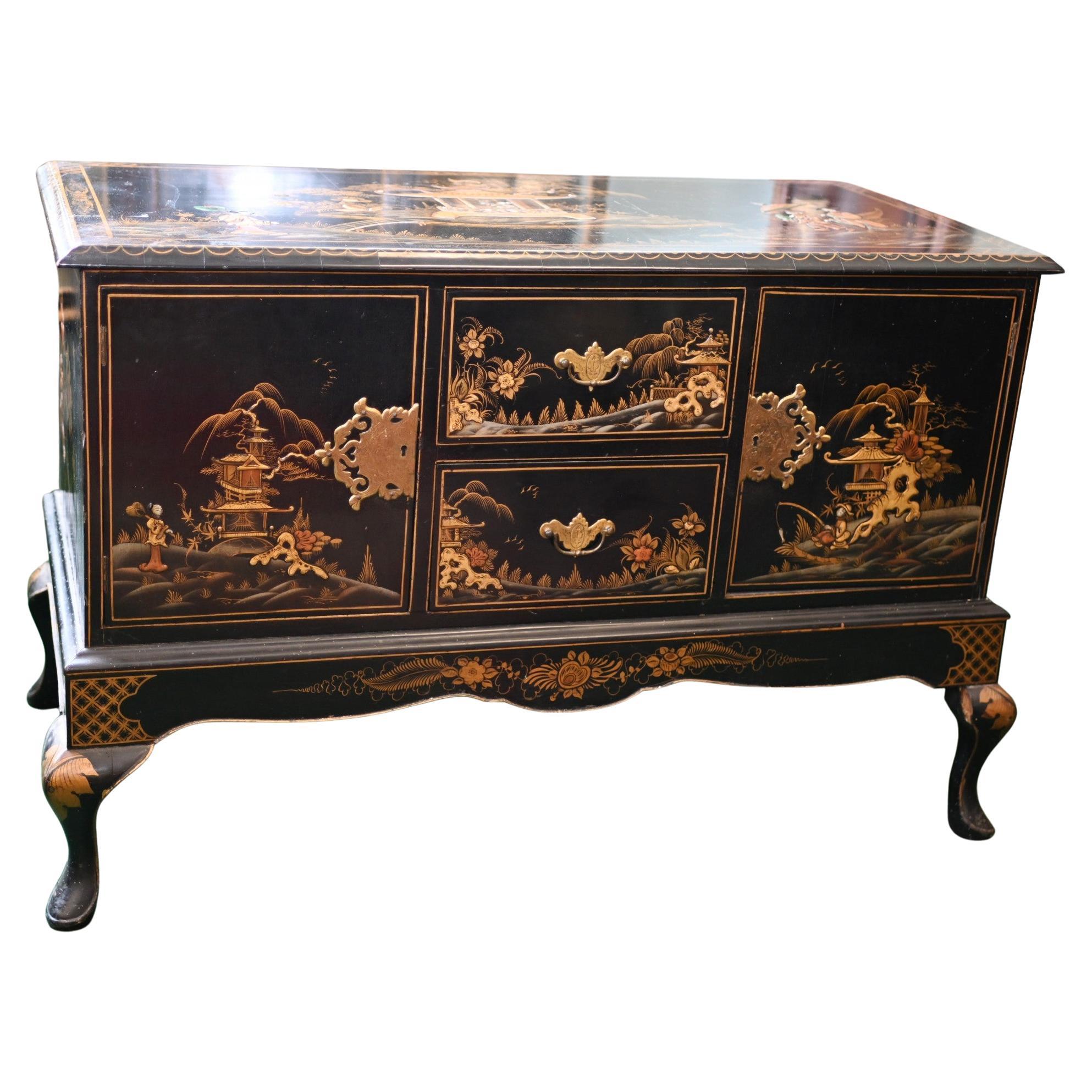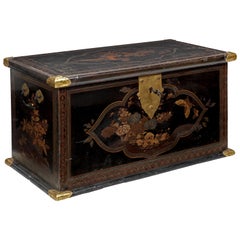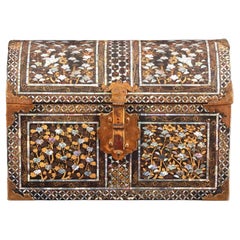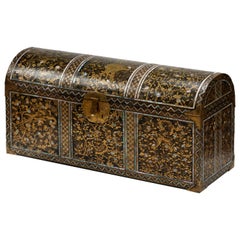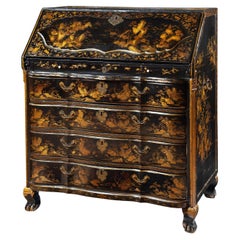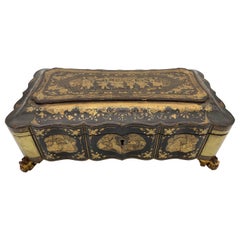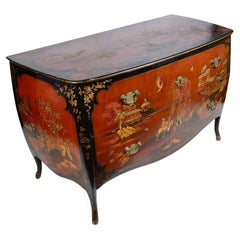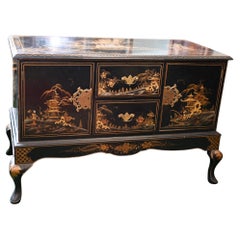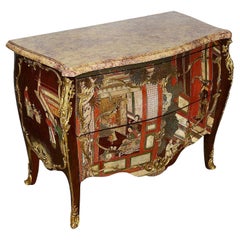Items Similar to 17th-Century Japanese Namban Lacquer Coffer on French Stand, Possibly by Boulle
Want more images or videos?
Request additional images or videos from the seller
1 of 5
17th-Century Japanese Namban Lacquer Coffer on French Stand, Possibly by Boulle
Price Upon Request
Price Upon Request
Price Upon Request
Price Upon Request
Price Upon Request
Price Upon Request
Price Upon Request
Price Upon Request
Price Upon Request
Price Upon Request
Shipping
Retrieving quote...The 1stDibs Promise:
Authenticity Guarantee,
Money-Back Guarantee,
24-Hour Cancellation
About the Item
An impressive and large Japanese 'Namban' transition-style lacquer coffer with fine gilt copper mounts on a French Re´gence base, possibly by André-Charles Boulle (1642-1732)
Kyoto, 1640-1650, the base 18th century
?The coffer with shaped cartouches on a nashiji ground on the lid, front and sides, with fine decorations in various techniques: takimaki-e (high relief), tsuke-gaki (drawing with narrow lacquer lines and over sprinkling with gold and silver), usuniku-takamei-e (demi relief), kimekomi (pushed inside) and accents of kirigane (small geometrical metal mosaics). Inside the cartouche on the lid a landscape with volcanos, at their feet temples and around their summits clouds. Inside the cartouche of the front a hilly landscape with trees, huts and two cows at a waterside, under clouds. The cartouches at the sides show autumn grasses, chrysanthemum and campanula, and the back is decorated with trails of clematis. The black lacquered and gilt mounts showing a mom, a Japanese family coat of arms, are quite similar to the black and gilt mounts of the Mazarin coffer in the V&A museum (inv. 412:1-1882) and the recently acquired coffer in the Rijksmuseum (inv. AK-RAK-2013-3-1).
Coffer: L. 132.7 x H. 62.8 x D. 59.3 cm
Stand: L. 143.7 x H. 51 x D. 71.9 cm
After the five-year lapse in trade with Japan as a result of the Taiwan Incident (see number 44 in Uit Verre Streken, November 2021, a woodblock print depicting the capture of Pieter Nuyts, the Dutch governor of Formosa/Taiwan, by Japanese sea captains in 1628), in 1633 ordering of Japanese lacquer by the VOC as well as by private trade seriously took off. Attempts by the VOC to prevent private trade were largely unsuccessful. Private traders were quicker, got the better pieces and often for better prices than the VOC which had to rely on officials whom themselves traded privately. It was not difficult for Dutch clients outside Japan, having the right connections with VOC officials in the Netherlands or Batavia, or even directly through merchants on Deshima, to buy Japanese lacquer. By its nature, private trade is rather elusive, usually lacking written documents such as letters, orders or invoices. Much private trade dealt in the same objects the Company bought, so these pieces can not be distinguished. Whether the present coffer was ordered by the VOC or by a private trader therefore can not be decided. By the end of the 17th century, because of complaints about the prices and the quality of the lacquer offered by the VOC, the Company decided to stop trading in lacquer altogether in 1693. Successful private trade in lacquer continued though.
- Dimensions:Height: 44.81 in (113.8 cm)Width: 56.58 in (143.7 cm)Depth: 28.31 in (71.9 cm)
- Materials and Techniques:
- Place of Origin:
- Period:
- Date of Manufacture:1640-1650, 18th Century
- Condition:Repaired: The coffer has been professionally restored at the usual places. Borders and the lid have been partially restored in Japanese lacquer techniques. Borders are often damaged due to minor chips of daily usage, and the lid often because it was cleaned. Wear consistent with age and use.
- Seller Location:Amsterdam, NL
- Reference Number:1stDibs: LU5458229633272
About the Seller
5.0
Recognized Seller
These prestigious sellers are industry leaders and represent the highest echelon for item quality and design.
Established in 1985
1stDibs seller since 2020
23 sales on 1stDibs
Typical response time: 2 hours
- ShippingRetrieving quote...Shipping from: Amsterdam, Netherlands
- Return Policy
Authenticity Guarantee
In the unlikely event there’s an issue with an item’s authenticity, contact us within 1 year for a full refund. DetailsMoney-Back Guarantee
If your item is not as described, is damaged in transit, or does not arrive, contact us within 7 days for a full refund. Details24-Hour Cancellation
You have a 24-hour grace period in which to reconsider your purchase, with no questions asked.Vetted Professional Sellers
Our world-class sellers must adhere to strict standards for service and quality, maintaining the integrity of our listings.Price-Match Guarantee
If you find that a seller listed the same item for a lower price elsewhere, we’ll match it.Trusted Global Delivery
Our best-in-class carrier network provides specialized shipping options worldwide, including custom delivery.More From This Seller
View AllLarge Royal Early 17th Century Japanese Lacquer Chest with Gilt-Bronze Mounts
Located in Amsterdam, NL
A large Japanese transitional lacquer chest with gilt-metal mounts
Edo period, early 17th century
The rectangular chest with flat hinged lid decorated in gold, silver, and red ...
Category
Antique Early 17th Century Japanese Blanket Chests
Materials
Bronze
Superb Late 16th Century Signed Colonial Japanese Namban Export Lacquer Coffer
Located in Amsterdam, NL
Superb late 16th century signed colonial Japanese Namban export lacquer coffer
Momoyama period, late 16th/early 17th century, inscribed 'Arisato' on the bottom
H. 30.5 x W. 43...
Category
Antique 16th Century Japanese Lacquer
Materials
Cedar, Lacquer
Large Japanese Namban Lacquer Coffer Arqueta, 16th Century
Located in Amsterdam, NL
A large Japanese Namban lacquer arqueta coffer for the Portuguese market
Kyoto, Momoyama-period, late 16th century
In Hinoki cypress lacquered in ...
Category
Antique 16th Century Japanese Decorative Boxes
Materials
Mother-of-Pearl, Wood
18th Century Chinese Export Lacquer Chinoiserie Bureau Desk for the Dutch Market
Located in Amsterdam, NL
An extremely rare, possibly unique, Chinese export lacquer bureau for the Dutch market
Canton, circa 1737
H. 118 x W. 102.5 x D. 63 cm
Provenance:
- Private collection, The Netherlands
- J.K. Driessen Antiques, Arnhem (Art Fair Breda, 1989)
- Noble collection, Belgium
Literature:
- C.J.A. Jörg, ’De handel van de V.O.C. in Oosters lakwerk in de 18de eeuw’ in: Nederlands Kunsthistorisch Jaarboek , Jr. 31 (1980), pp. 355-363 (ill.)
- Annigje Hofstede, Nederlandse meubelen van Barok tot Biedermeier, 1700-1830, Waanders, Zwolle 2004, pp. 35-37 (ill.)
This lacquer bureau is one of the four writing desks purchased in Canton in 1737, and as far as is known, this is the only remaining bureau of its type from the period. As the VOC believed that large pieces of import took up too much valuable space in their trading ships...
Category
Antique Mid-18th Century Chinese Chinese Export Lacquer
Materials
Wood, Cypress, Lacquer
$89,938
Free Shipping
Rare Charming 17th Century Japanese Lacquer Cabinet with Gilt-Bronze Mounts
Located in Amsterdam, NL
A fine Japanese pictoral style lacquer cabinet with gilt-metal mounts
Kyoto, Edo period, 1670-1690
Decorated in Japanese relief lacquer work, black lacquer ground decorated...
Category
Antique Late 17th Century Japanese Furniture
Materials
Bronze
$44,969 Sale Price
25% Off
Free Shipping
Portuguese-colonial Japanese Namban lacquer Vargueno Cabinet, circa 1600
Located in Amsterdam, NL
A Portuguese-colonial Japanese Namban lacquer vargueno cabinet
Momoyama period, circa 1600
H. 43 x W. 64.5 x D. 36 cm
Wood, black lacquered and deco...
Category
Antique Early 1600s Japanese Antiquities
Materials
Gold, Brass
You May Also Like
19th Century Chinese Lacquer Gaming Box
Located in Brea, CA
19th century Chinese lacquer gaming box from the Qing Dynasty. Black and golden drawing by hand with 3 gaming lacquer boxes, in very good ...
Category
Antique 19th Century Chinese Qing Lacquer
Materials
Lacquer
Chinoiserie lacquer commode, 18th Century Venetian style.
Located in Brighton, Sussex
A very decorative and imposing early 18th Century Venetian, Red Chinoiserie lacquer bombe commode.
Having ebonized boarders with gilded scrolling foliate decoration surrounding inset...
Category
Antique Early 18th Century Italian Commodes and Chests of Drawers
Materials
Pine, Lacquer
Chinese Lacquer Sideboard Chinoiserie Cabinet 1920
Located in Potters Bar, GB
Wonderful English mahogany side cabinet after Chippendale
Features the trademark Chippendale feature with ball and claw feet
Elegant designs to door and side with floral motifs and r...
Category
Vintage 1920s Commodes and Chests of Drawers
Materials
Mahogany
18th Century style Chinoiserie lacquer commode.
Located in Brighton, Sussex
This exquisite French bombe-shaped commode, crafted in the 18th-century Chinoiserie style, showcases intricate Coromandel lacquer work, vibrant with depictions of Chinese scenes. Cir...
Category
Antique Late 19th Century French Commodes and Chests of Drawers
Materials
Breccia Marble, Ormolu
19th Century Lacquered Chinoiserie Sewing Box
Located in Charlottesville, VA
A nice Papier mache box. There are lots of compartments and drawers.
Category
Antique 19th Century Decorative Boxes
Materials
Wood, Lacquer
Japanese Namban Lacquer and Inlay Coffer Momoyama Period
Located in Atlanta, GA
A rare Japanese Namban Lacquer domed coffer circa 1570-1610s of Azuchi-Momoyama to early Edo period. These types of lacquerware were made for export to ...
Category
Antique 16th Century Japanese Japonisme Lacquer
Materials
Wood, Lacquer
More Ways To Browse
French Lacquer
The Lacquer Company
Black Lacquer French
Black Gold Lacquer
Century Furniture Company Asian Furniture
French Boulle
17th Century Copper
17th Century Brass Furniture
Boulle Furniture Antique
Sea Captain
Japanese Gilt Wood
Gold Ormolu Stand
Voc Antique
Japanese Wood Temple
Andre Charles Boulle Furniture
Andre Charles Boulle
Temple Lacquer
Antique Wood Letters
